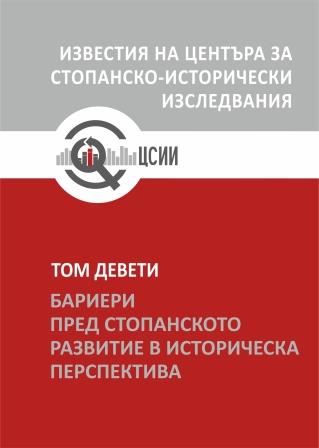Проституцията в България през ХІХ, ХХ и ХХІ век – от стопанска дейност до тунеядство
Prostitution in Bulgaria during the 19th, 20th and 21st Centuries – from Economic Activity to Social Parasitism
Author(s): Georgi PetrunovSubject(s): History, Economy, National Economy, Economic history, Social history, Modern Age, Recent History (1900 till today), Public Finances, Human Resources in Economy, Business Ethics, Socio-Economic Research
Published by: Център за стопанско-исторически изследвания
Keywords: public policies; state regulation; prostitution; economic activity; political influence
Summary/Abstract: The text focuses on the way in which the Bulgarian state behaves toward prostitution in a historical perspective. Emphasis is placed on the economic facets associated with prostitution and the influence of political factors in classifying an activity as economic or not. Prostitution was not unknown in the Bulgarian territories before the Liberation. However, the social and economic transformations that took place in the country after 1878 led to its expansion. Due to the significant economic interest associated with brothels, the concept of regulation of prostitution was adopted. At the dawn of the 20th century, it was recognized as a profession, with entrepreneurs eager to invest in building facilities where this economic activity could take place. In several major cities, authorities are developing regulations to manage prostitution, detailing the conditions for conducting such work and the fees that will be collected by the municipality. Prostitution functioned under these conditions in Bulgaria for four decades until the early 1920s. At that time, largely due to public disapproval, legislation was enacted to prohibit brothels. However, during the interwar period, policies towards prostitution remained tacitly permissive. In the socialist state, prostitution is considered a shameful legacy of the bourgeois-capitalist way of life, and the activity of prostitutes is treated as unproductive and socially useless, and in that way it is considered a form of “social parasitism and laziness”. Despite the shifts in political and economic systems since 1989, this policy remained in effect until 2022, even though its inadequacy given the democratic conditions and policies of other EU countries. The analysis indicates that the state’s perception of prostitution is filtered through concepts of labor and economic benefit. However, ideological and political factors influence the way this labor will be interpreted. The moral dilemmas surrounding the sale of human bodies also affect the legal status of prostitution in society. In the current situation, politicians often hesitate to initiate discussions on policies that address phenomena deemed immoral. The result is that in Bulgaria, the topic of prostitution remains taboo, it’s widely acknowledged yet rarely discussed. This silence predominantly benefits criminal activities.
Journal: Известия на Центъра за стопанско-исторически изследвания
- Issue Year: IX/2024
- Issue No: 1
- Page Range: 256-268
- Page Count: 13
- Language: Bulgarian

